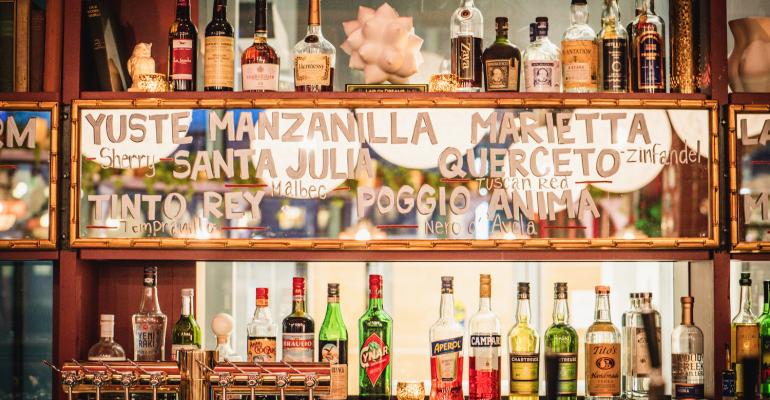As more wineries offer vino in kegs, more restaurants have started offering wine one tap, and Three Saints Revival in Denver has fully embraced the program.
"Since starting the 28-tap wine program in late May 2023, we’ve only seen the share of beverage sales for wine increase," general manager Conor McKenzie said. "Once guests have that first taste, they’re all in on draft wine."
Many other restaurants around town feature two to four wines on tap, but this Mediterranean restaurant by Robert Thompson can serve a much wider variety, ranging from Sacchetto sparkling rosé from Italy to North by Northwest Riesling from Washington State to Santa Julia Malbec from Argentina. Sizes are served in 2.5-ounce, 5-ounce, 8-ounce, and liter pours. For the smallest pour prices range from $5 to $10, and liter pours start at $60 and go up to $96. The standard 5-ounce glass wine starts at $10 and goes up to $24.
"We decided to implement the largest tap wine program in Colorado because of the benefits to our business, our guests and the environment," Thompson said. "Wine on tap gives the guests an opportunity to utilize our 2.5-ounce pour and have fun exploring our offerings, and it protects the margin the business needs by not offering free samples."
Behind the bar this means the staff has fewer touches in order to get the drink, which in turn creates a faster and cleaner service for the diners. As labor shortages continue, added Thompson, focusing on draft wine can save bartenders time and reduce the risk of spreading them too thin.
"Another benefit is consistency and the cost savings from cutting the open bottles," said Thompson. "The tap system eliminates the effects of oxygen, wine's biggest enemy, which means poor tasting, oxidized bottles are a thing of the past."
Each keg holds the equivalent to 26 bottles of wine. By using refillable kegs, the would-be trash from glass bottles is eliminated. Thompson estimates Three Saints Revival's wine program will save around 1,133 gallons of fuel; at least 8,700 wine bottles from the landfill; and use between 22,000 to 27,000 pounds less of CO2 emissions.
Of course, convincing diners that keg wine is just as good as that glass bottle has its own challenges. That's where education of the wines and the system comes in. One myth the staff eagerly quashes is the idea that all wine needs to age before being enjoyed. Thompson said that around 90% of the world's wines are actually meant to be drunk the year they are bottled, or in this case, kegged. Unlike a bottle of wine that can change with exposure to air, each glass tapped from the pressure-controlled keg tastes the same.
"Even if a guest starts on the fence about ordering wine from the draft system, the more they learn about the fresh taste and the positive environmental impacts, they become tap wine enthusiasts by the end of the night," McKenzie said. "Before rolling out the wine program, our cocktails-to-wine sales were two-to-one, now they are one-to-one."
Using 25 kegs per month, and about 300 per year, the wine on tap program saves money for the restaurant too. Keg wine by-the-ounce costs between 10% and 20% less when compared to typical bottled wine, Thompson said.
"Those savings gets passed along to our guests, and again, the significant reduction in wasting open and oxidized or corked bottles really helps our margin," he said. "We also are able to save in bar labor as the program is more efficient than a big cocktail program and our bar prep labor has decreased."
Since rolling out the program in May, there has already been a 35% decrease in the cost of goods sold. So not only does the system help with the environmental impact of wine bottle waste, but can save funds for both the customer and the restaurant. For all those reasons, Thompson sees a bright future for kegged wine, and is proud he was one of the first in Colorado to implement such a large offering of it.





